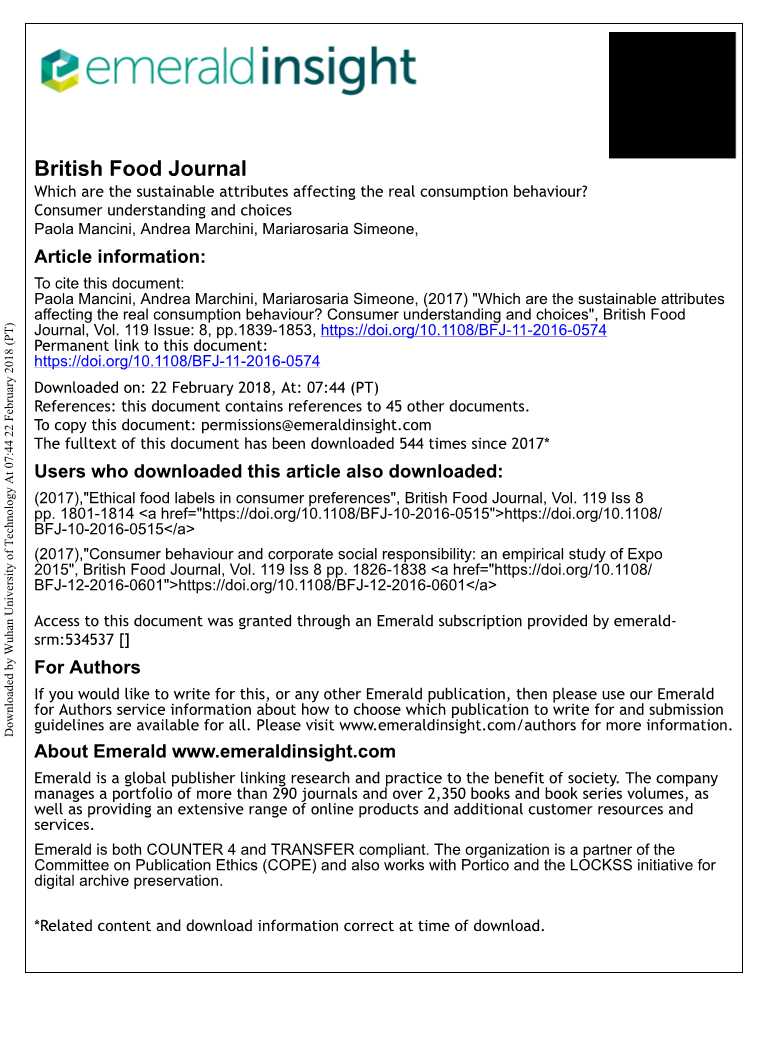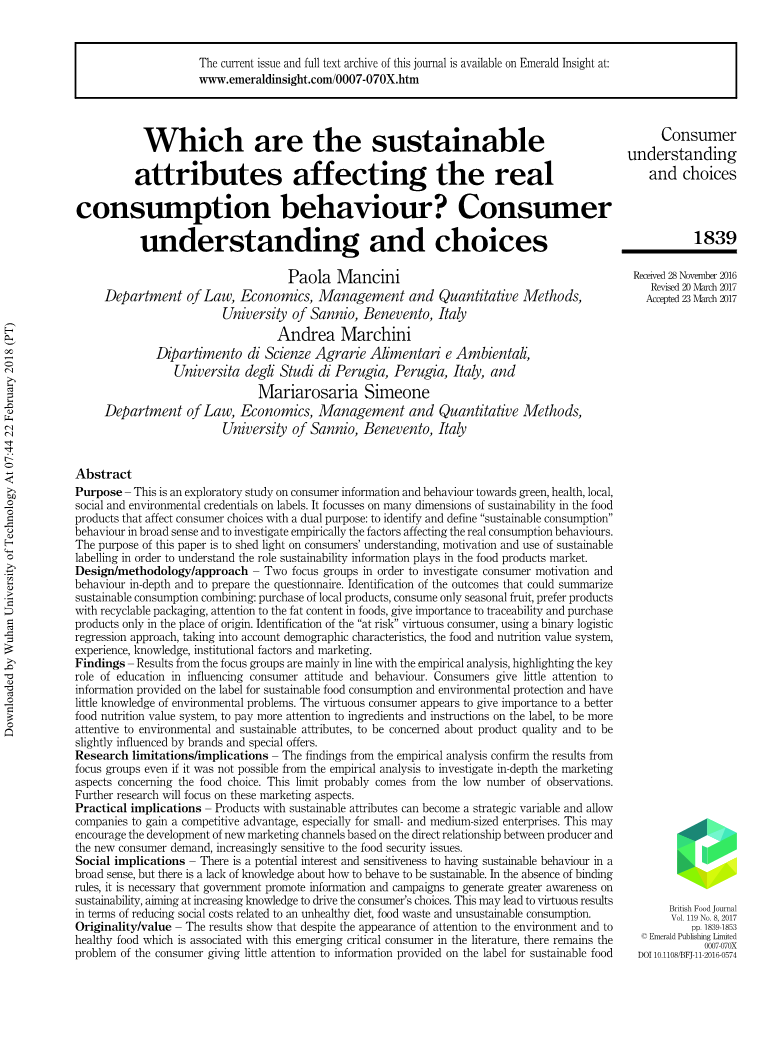

英语原文共 16 页,剩余内容已隐藏,支付完成后下载完整资料
Which are the sustainable attributes affecting the real consumption behaviour? Consumer understanding and choices
哪些是影响实际消费行为的可持续属性?消费者的理解和选择
Abstract摘要
Purpose – This is an exploratory study on consumer information and behaviour towards green, health, local,social and environmental credentials on labels. It focusses on many dimensions of sustainability in the foodproducts that affect consumer choices with a dual purpose: to identify and define “sustainable consumption”ehaviour in broad sense and to investigate empirically the factors affecting the real consumption behaviours.The purpose of this paper is to shed light on consumersrsquo; understanding, motivation and use of sustainable labelling in order to understand the role sustainability information plays in the food products market.
目的——这是一项关于消费者对标签上的绿色、健康、地方、社会和环境方面信息接受情况和表现行为的探索性研究。该研究侧重于食品中可持续性的许多方面,这些方面影响消费者具有双重目的选择:识别和界定广义上的“可持续消费”行为,并对影响实际消费行为的因素进行实证研究。本文旨在了解消费者对可持续标签的理解、动机和使用情况,以了解可持续发展信息在食品市场中的作用。
Design/methodology/approach – Two focus groups in order to investigate consumer motivation and behaviour in-depth and to prepare the questionnaire. Identification of the outcomes that could summarize sustainable consumption combining: purchase of local products, consume only seasonal fruit, prefer products with recyclable packaging, attention to the fat content in foods, give importance to traceability and purchase products only in the place of origin. Identification of the “at risk” virtuous consumer, using a binary logistic regression approach, taking into account demographic characteristics, the food and nutrition value system, experience, knowledge, institutional factors and marketing.
研究方法——以便深入调查消费者的动机和行为,将实验对象划分为两个重点小组,并编写调查表。确定能概括为可持续消费的结果:购买当地产品,只消费季节性水果,喜欢用可回收包装的产品,注重食品中的脂肪含量,重视产品的可追溯性,仅在原产地购买产品。使用二元逻辑回归方法确定“有风险”的良性消费者,同时考虑人口统计特征,食品和营养价值体系,经验,知识,制度因素和营销方式。
Findings – Results from the focus groups are mainly in line with the empirical analysis, highlighting the key role of education in influencing consumer attitude and behaviour. Consumers give little attention to information provided on the label for sustainable food consumption and environmental protection and have little knowledge of environmental problems. The virtuous consumer appears to give importance to a better food nutrition value system, to pay more attention to ingredients and instructions on the label, to be more attentive to environmental and sustainable attributes, to be concerned about product quality and to be slightly influenced by brands and special offers.
调查结果——重点小组的结果主要与实证分析相一致,突出了教育是影响消费者态度和行为的关键因素。消费者对可持续食品消费和环境保护标签上提供的信息关注较少,对环境问题知之甚少。良性消费者似乎更重视优质的食品营养价值体系,会重点关注标签上的成分和说明,更加注重食物的环保性和可持续发展性,关心产品的质量,并会受到品牌和优惠力度的轻微影响。
Research limitations/implications – The findings from the empirical analysis confirm the results from focus groups even if it was not possible from the empirical analysis to investigate in-depth the marketing aspects concerning the food choice. This limit probably comes from the low number of observations. Further research will focus on these marketing aspects.
研究局限/影响-实证分析的结果证实了重点小组的结果,即使不可能从实证分析中深入调查与在营销方面的有关食品选择。这一限制可能是较少的观察结果导致的,进一步的研究将集中在这些营销方面。
Practical implications – Products with sustainable attributes can become a strategic variable and allow companies to gain a competitive advantage, especially for small- and medium-sized enterprises. This may encourage the development of new marketing channels based on the direct relationship between producer and the new consumer demand, increasingly sensitive to the food security issues.
实际意义——具有可持续发展性的产品可以成为“金牛”产品,使公司赢得竞争优势,特别是对中小型企业而言。这可能会鼓励基于生产者与新的消费者需求之间的直接关系来开发新的营销渠道,这些渠道对粮食安全问题会越来越敏感。
Social implications – There is a potential interest and sensitiveness to having sustainable behaviour in a broad sense, but there is a lack of knowledge about how to behave to be sustainable. In the absence of binding rules, it is necessary that government promote information and campaigns to generate greater awareness on sustainability, aiming at increasing knowledge to drive the consumerrsquo;s choices. This may lead to virtuous results in terms of reducing social costs related to an unhealthy diet, food waste and unsustainable consumption
社会影响——广义上具有可持续行为的潜在利益和敏感性,但缺乏如何表现为可持续性行为的知识。在缺乏具有约束力规则的情况下,政府必须倡导相关信息和活动,以提高人们对可持续性的认识,旨在提高认知来促使消费者作出选择。这可以达到减少不健康饮食、食物浪费和不可持续消费相关的的社会成本方面的良性目的。
Originality/value – The results show that despite the appearance of attention to the environment and to healthy food which is associated with this emerging critical consumer in the literature, there remains the problem of the consumer giving little attention to information provided on the label for sustainable food consumption and environmental protection. This is the problem of “rules of thumb” in purchasing decisions that prevail in the following situations: when consumers have an overload of information that exceeds their processing limits; when they tend to base their decision making on heuristics, focussing their choices on brands as a proxy for high-quality, product-related characteristics.
原创性/价值——结果表明,尽管文献中表明对环境和健康食品的关注与这一类新兴的关键消费者有关,仍然存在消费者很少关注标签上提供的用于可持续食品消费和环境保护的信息的问题。这是在以下情况下普遍存在的购买决策中的“经验法则”问题:当消费者获取到过多的难以理解的信息时;当他们倾向于将决策建立在启发式的基础上时,他们会将选择集中在优质的品牌和与产品相关的特性的代名词上。
Keywords Focus group, Environment, Food attributes, Logistic approach, Sustainable products, Virtuous consumers
关键词:小组;环境;食品属性;物流方法;可持续产品;良性消费者
Paper type Research paper
1. Introduction简介
Nowadays consumers are more and more interested in obtaining information about products, even if it means paying higher prices. Consumer
全文共56062字,剩余内容已隐藏,支付完成后下载完整资料
资料编号:[2281]
以上是毕业论文外文翻译,课题毕业论文、任务书、文献综述、开题报告、程序设计、图纸设计等资料可联系客服协助查找。


